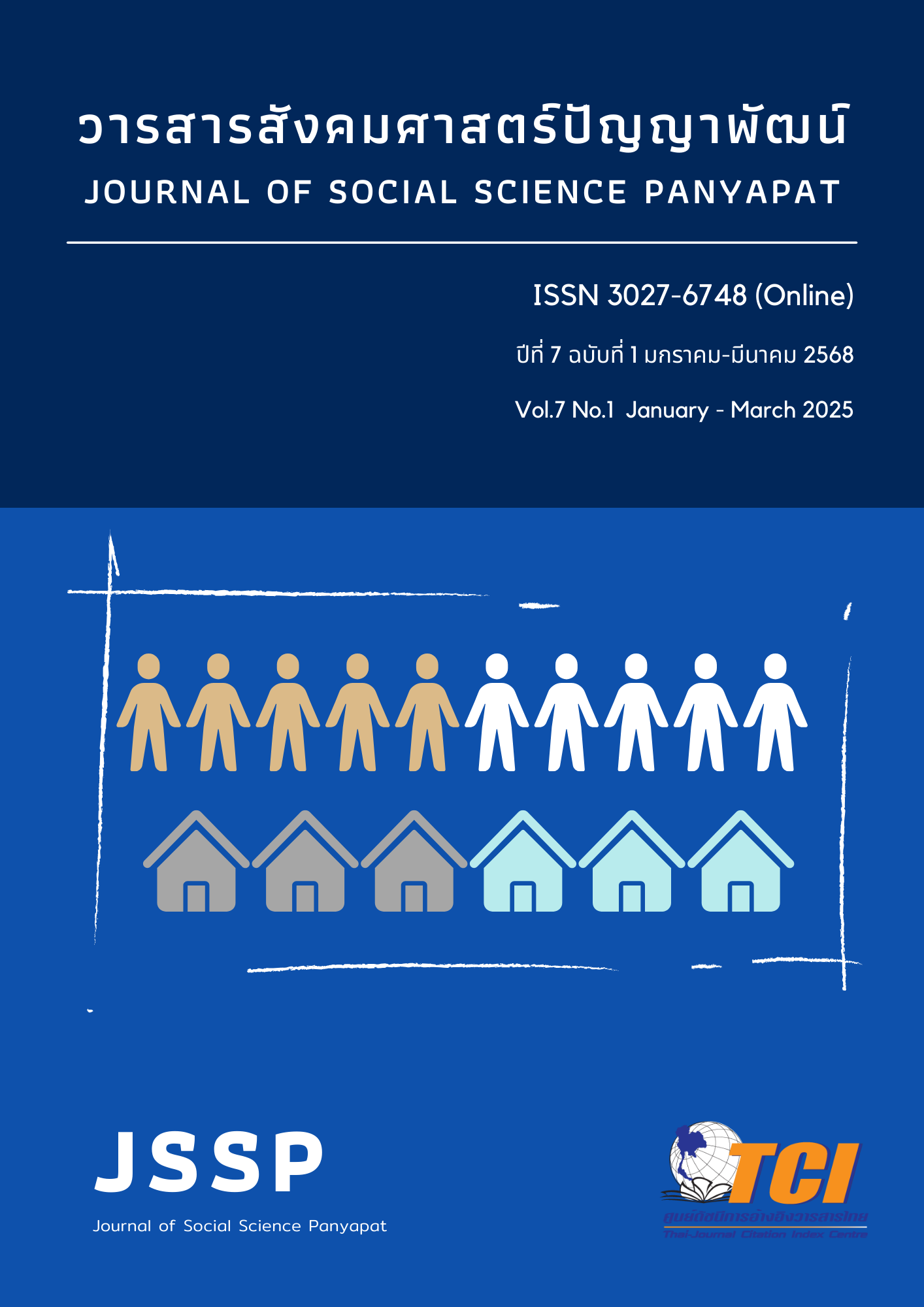การจัดการเรียนรู้โดยใช้เกมเป็นฐาน (Game – based Learning) เพื่อพัฒนาผลสัมฤทธิ์ทางการเรียน เรื่องแคลคูลัสเบื้องต้น ของผู้เรียนชั้นมัธยมศึกษาปีที่ 6 โรงเรียนปะเหลียนผดุงศิษย์
คำสำคัญ:
การจัดการเรียนรู้โดยใช้เกมเป็นฐาน, ผลสัมฤทธิ์ทางการเรียน, ความพึงพอใจบทคัดย่อ
งานวิจัยนี้มีวัตถุประสงค์เพื่อ (1) เปรียบเทียบผลสัมฤทธิ์ทางการเรียนหลังเรียนของผู้เรียนชั้นมัธยมศึกษาปีที่ 6 ระหว่างกลุ่มทดลองที่มีการจัดการเรียนรู้โดยใช้เกมเป็นฐานกับกลุ่มควบคุมที่มีการจัดการเรียนรู้แบบการสอนปกติ และ (2) ศึกษาความพึงพอใจของผู้เรียนกลุ่มทดลองที่มีต่อการจัดการเรียนรู้โดยใช้เกมเป็นฐาน (Game-Based Learning) กลุ่มตัวอย่างที่ใช้ในการวิจัยครั้งนี้ ได้แก่ ผู้เรียนชั้นมัธยมศึกษาปีที่ 6/1 ปีการศึกษา 2567 โรงเรียนปะเหลียนผดุงศิษย์ จำนวน 33 คน ซึ่งเป็นกลุ่มทดลอง และผู้เรียนชั้นมัธยมศึกษาปีที่ 6/2 ปีการศึกษา 2567 โรงเรียนปะเหลียนผดุงศิษย์ จำนวน 35 คน ซึ่งเป็นกลุ่มควบคุม โดยกำหนดกลุ่มตัวอย่างได้มาจากการสุ่มแบบกลุ่ม (Cluster Random Sampling) เครื่องมือที่ใช้เก็บรวบรวมข้อมูล ได้แก่ 1) แผนการจัดการเรียนรู้โดยใช้เกมเป็นฐาน 2) แผนการจัดการเรียนรู้แบบการสอนปกติ 3) แบบทดสอบวัดผลสัมฤทธิ์ทางการเรียน 4) แบบประเมินความพึงพอใจที่มีต่อการจัดการเรียนรู้โดยใช้เกมเป็นฐาน วิเคราะห์ความเหมาะสมและหาคุณภาพของแผนการจัดการเรียนรู้โดยใช้เกมเป็นฐานและแผนการจัดการเรียนรู้แบบการสอนปกติ โดยใช้ค่าเฉลี่ยและส่วนเบี่ยงเบนมาตรฐาน วิเคราะห์ผลสัมฤทธิ์ทางการเรียนหลังเรียนของกลุ่มทดลองและกลุ่มควบคุม โดยใช้การทดสอบค่าทีแบบ independent sample t-test เปรียบเทียบผลสัมฤทธิ์ทางการเรียนก่อนเรียนและหลังเรียนระหว่างกลุ่มทดลองและกลุ่มควบคุม โดยใช้การหาคะแนนพัฒนาการสัมพัทธ์ (RG) วิเคราะห์ความพึงพอใจที่มีต่อการจัดการเรียนรู้โดยใช้เกมเป็นฐานของผู้เรียนกลุ่มทดลอง โดยหาค่าเฉลี่ยและส่วนเบี่ยงเบนมาตรฐาน ผลการศึกษาพบว่า ผลสัมฤทธิ์ทางการเรียนหลังเรียนของผู้เรียนชั้นมัธยมศึกษาปีที่ 6 ของกลุ่มทดลองสูงกว่ากลุ่มควบคุม อย่างมีนัยสำคัญทางสถิติที่ระดับ .05 และผู้เรียนกลุ่มทดลองมีความพึงพอใจต่อการจัดการเรียนรู้โดยใช้เกมเป็นฐาน (Game-Based Learning) โดยรวมอยู่ในระดับมากที่สุด
เอกสารอ้างอิง
กระทรวงศึกษาธิการ. (2560). ตัวชี้วัดและมาตรฐานการเรียนรู้กลุ่มสาระการเรียนรู้คณิตศาสตร์ หลักสูตรแกนกลางการศึกษาขั้นพื้นฐาน. กรุงเทพฯ: กระทรวงศึกษาธิการ.
จิตรทิวัส วงษ์หาบุศย์ และ ปิยลักษณ์ โพธิวรรณ์. (2567). การพัฒนากิจกรรมการเรียนรู้โดยใช้เกมเป็นฐาน เรื่อง ศาสนากับสังคมไทย สำหรับนักเรียนชั้นมัธยมศึกษาปีที่ 4. วารสารสังคมศาสตร์ปัญญาพัฒน์, 6(3), 269-280.
ทิศนา แขมมณี. (2560). ศาสตร์การสอน: องค์ความรู้เพื่อการจัดกระบวนการเรียนรู้ที่มีประสิทธิภาพ. (พิมพ์ครั้งที่ 8). กรุงเทพฯ: จุฬาลงกรณ์มหาวิทยาลัย.
ธิดารัตน์ เลิศวิทยากุล. (2560). การประเมินความก้าวหน้าการเรียนรู้โดยใช้เกมเป็นฐาน. วารสารวิทยาลัยบัณฑิตเอเซีย, 7(พิเศษ), 104-116.
บุญชม ศรีสะอาด. (2560). การวิจัยเบื้องต้น ฉบับปรับปรุงใหม่. (พิมพ์ครั้งที่10). กรุงเทพฯ: สุวีริยาสาส์น
ลดาวัลย์ แย้มครวญ และ ศุภกฤษฏิ์ นิวัฒนากูล. (2561). การใช้เกมเพื่อการเรียนรู้สำหรับส่งเสริมทักษะกระบวนการทางคณิตศาสตร์ของนักเรียนชั้นประถมศึกษาปีที่ 6. Journal of Information Science and Technology, 7(1), 33-41.
สำนวน คุณพล. (2566). การจัดการเรียนรู้โดยใช้เกมเป็นฐาน เพื่อพัฒนาผลสัมฤทธิ์ทางการเรียนวิชาคณิตศาสตร์ของนักเรียนระดับชั้นมัธยมศึกษาปีที่ 1. วารสารศึกษาศาสตร์ มมร, 11(2), 247-259.
อรรถพล ศรัทธาผล และ สืบสกุล อยู่ยืนยง. (2566). การศึกษาผลการจัดกิจกรรมการเรียนรู้เรื่องอสมการเชิงเส้นตัวแปรเดียวโดยใช้เกมเป็นฐานของนักเรียนชั้นมัธยมศึกษาปีที่ 3 โรงเรียนท่ามะกาวิทยาคม จังหวัดกาญจนบุรี. วารสารวิชาการสถาบันพัฒนาพระวิทยากร, 6(3), 158–168.
Cronbach, L. J. (1990). Essentials of psychological testing. (5th ed.). New York: Harper Collins.
Gee, J. P. (2003). What video games have to teach us about learning and literacy. Computers in entertainment, 1(1), 20-20.
ดาวน์โหลด
เผยแพร่แล้ว
รูปแบบการอ้างอิง
ฉบับ
ประเภทบทความ
สัญญาอนุญาต
ลิขสิทธิ์ (c) 2025 วารสารสังคมศาสตร์ปัญญาพัฒน์

อนุญาตภายใต้เงื่อนไข Creative Commons Attribution-NonCommercial-NoDerivatives 4.0 International License.


